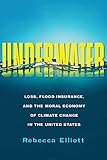Underwater : Loss, Flood Insurance, and the Moral Economy of Climate Change in the United States / Rebecca Elliott.
Material type: TextSeries: Society and the EnvironmentPublisher: New York, NY : Columbia University Press, [2021]Copyright date: ©2021Description: 1 online resourceContent type:
TextSeries: Society and the EnvironmentPublisher: New York, NY : Columbia University Press, [2021]Copyright date: ©2021Description: 1 online resourceContent type: - 9780231548816
- Climatic changes -- Economic aspects -- United States
- Flood damage -- Economic aspects -- United States
- Flood damage -- Social aspects -- United States
- Flood insurance -- Government policy -- United States
- Flood insurance -- Moral and ethical aspects -- United States
- Flood insurance -- Social aspects -- United States
- Liability for environmental damages -- United States
- SOCIAL SCIENCE / Sociology / General
- FEMA
- NFIP
- climate change
- economics of loss
- flood insurance
- sociology of loss
- 368.122 23
- HG9983.3
- online - DeGruyter
| Item type | Current library | Call number | URL | Status | Notes | Barcode | |
|---|---|---|---|---|---|---|---|
 eBook
eBook
|
Biblioteca "Angelicum" Pont. Univ. S.Tommaso d'Aquino Nuvola online | online - DeGruyter (Browse shelf(Opens below)) | Online access | Not for loan (Accesso limitato) | Accesso per gli utenti autorizzati / Access for authorized users | (dgr)9780231548816 |
Frontmatter -- CONTENTS -- ACKNOWLEDGMENTS -- TIMELINE OF EVENTS -- INTRODUCTION Insurance and the Problem of Loss in a Climate-Changed United States -- Chapter One TRANSFORMING THE MANAGEMENT OF LOSS The Origins of the National Flood Insurance Program -- Chapter Two LOSING GROUND Values at Risk in an American Floodplain -- Chapter Three VISIONS OF LOSS Knowing and Pricing Flood Risk -- Chapter Four SHIFTING RESPONSIBILITIES FOR LOSS National Reform of Flood Insurance -- Chapter Five FLOODPLAIN FUTURES Trajectories of Loss -- CONCLUSION What Do We Have to Lose? -- METHODOLOGICAL APPENDIX -- NOTES -- INDEX
restricted access online access with authorization star
http://purl.org/coar/access_right/c_16ec
Communities around the United States face the threat of being underwater. This is not only a matter of rising waters reaching the doorstep. It is also the threat of being financially underwater, owning assets worth less than the money borrowed to obtain them. Many areas around the country may become economically uninhabitable before they become physically unlivable.In Underwater, Rebecca Elliott explores how families, communities, and governments confront problems of loss as the climate changes. She offers the first in-depth account of the politics and social effects of the U.S. National Flood Insurance Program (NFIP), which provides flood insurance protection for virtually all homes and small businesses that require it. In doing so, the NFIP turns the risk of flooding into an immediate economic reality, shaping who lives on the waterfront, on what terms, and at what cost.Drawing on archival, interview, ethnographic, and other documentary data, Elliott follows controversies over the NFIP from its establishment in the 1960s to the present, from local backlash over flood maps to Congressional debates over insurance reform. Though flood insurance is often portrayed as a rational solution for managing risk, it has ignited recurring fights over what is fair and valuable, what needs protecting and what should be let go, who deserves assistance and on what terms, and whose expectations of future losses are used to govern the present. An incisive and comprehensive consideration of the fundamental dilemmas of moral economy underlying insurance, Underwater sheds new light on how Americans cope with loss as the water rises.
Mode of access: Internet via World Wide Web.
In English.
Description based on online resource; title from PDF title page (publisher's Web site, viewed 01. Dez 2022)


